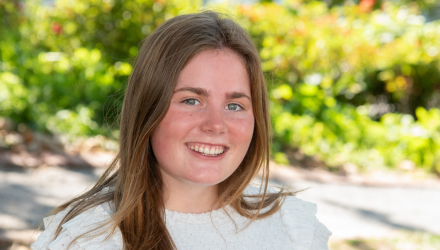Name: Anna Morrow
Age: 19
Where do you call home? Baltimore, MD
What is your education [degree(s)]? What is a current goal you have with your education? How will FA add to your future [career]? I completed my first year at Davidson College in Davidson, NC, with an intended major in Public Health. I will graduate from Davidson in 2028 with hopes for some sort of graduate program. I am unsure of my specific post-graduate plans, but I am interested in public health and research advocacy because of my FA diagnosis and connection with FARA.
Who do you live with? In Baltimore, I live with my Mom, Kristin, Dad, Ben, and three siblings, Patrick, Maggie, and Sam.
What’s a typical day for you? I typically have class in the morning and spend afternoons and evenings in the library with time saved for other responsibilities like recording statistics for various teams on campus, writing for the newspaper, or attending a club meeting. I also make sure to get meals with friends and spend some time in a coffee shop!
How long have you known you are living with FA? When and how were you diagnosed? I was diagnosed with FA ten years ago, in June of 2015.
Are there any others with FA in your family? No other FAers in my family. Two of my siblings are carriers and the other is not affected.
Describe your transition from walking to walker/wheelchair. My transition from walking independently, to rollator, to wheelchair coincided with my progression through middle and high school. While this was very difficult, my eventual use of a wheelchair allowed me to move freely around school and keep up with friends.
What do you like to do to stay active and what type of exercises work for you to stay strong? I enjoy going to the gym with my Dad who helps me do a variety of exercises. I also use my trike as a way to move.
Do you have any hobbies or special interests? I am a really big sports fan! I watch every Baltimore Ravens game and work for my college’s football team. In addition to football, I work with the field hockey and lacrosse teams to record statistics. I grew up playing and watching these sports, so have loved being around them in college.
What is a good trick to make daily life easier? (Very practical!) Super Pole everywhere! It makes traveling so much easier and allows more independence.
When FA gets you down, what do you think/do to feel better? Telling the people around me I am feeling that way is my favorite way to work through it. My people want to help me in any way they can, but there is nothing they can do if I stay quiet.
What is one way living with FA has POSITIVELY affected your life? I have met so many incredible FAers, doctors, researchers, and advocates who inspire me to make an impact on the rare disease community.
What is a favorite motivational quote of yours? My Mom provides a great reminder to be “brave & kind.” These two words mean something different every day, but are always a positive way to lead my actions.
What is a piece of advice that someone with FA has given you that encourages and inspires you? I commonly fall for Kyle Bryant’s quote from The Ataxian, “If this is what it takes, that’s a small price to pay. So, we’ll get it done.” This negation of effort allows for more perspective. While difficult, the time and energy I am using to advocate and fundraise is a “small price to pay” in the fight to cure FA.
What is the best advice YOU could give to a person who has been newly diagnosed with FA? Tell other people how they can help! Whether that’s asking a friend to change your sheets, providing information to contact representatives about rare disease research, or asking for donations, over-communicate your own and the FA community’s needs.
What is the first thing you want to do when a cure/treatment for FA is found? I am going to invite my family and all my lacrosse teammates to play catch! I have a few reps to catch up on!
“I have FA but FA doesn’t have me.” What does this statement mean to you? This is a complicated statement because it is difficult to try to live in opposition to the FA while accepting my current abilities. But, I think its sentiment of not letting FA disturb my goals is encouraging.
How do you live your life in the face of adversity? Adversity forces greater connections. These connections are formed by vulnerability that has been a necessity living with a rare disease. Because of FA, I have deeper relationships that help me to live in the face of adversity.
Tell us a little more about you….I would love to live in DC working in policy to impact public health! I am a mountains-over-beach person, a reader, and a dog person!
Interview by
Mary Nadon Scott
